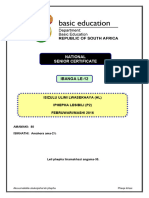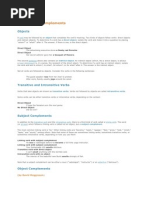Phrasal Verbs Podcast
Phrasal Verbs Podcast
Uploaded by
NidiaPalacioCopyright:
Available Formats
Phrasal Verbs Podcast
Phrasal Verbs Podcast
Uploaded by
NidiaPalacioOriginal Description:
Copyright
Available Formats
Share this document
Did you find this document useful?
Is this content inappropriate?
Copyright:
Available Formats
Phrasal Verbs Podcast
Phrasal Verbs Podcast
Uploaded by
NidiaPalacioCopyright:
Available Formats
English Foreign Language Podcast Taking the frustration out of Phrasal Verbs
Nidia: Welcome to English as a Foreign Language Podcast, Taking the frustration out of phrasal verbs. I'm Nidia Palacio coming to you from NICA University in the wonderful city of Bogot, in the beautiful country, Colombia, and this time on Wordmaster English teacher Myriam Palacios joins us from New York city to talk about phrasal verbs. Myriam: Thank you for inviting me to share with all of you this nice topic. Nidia: On today's podcast, we are going to talk about phrasal verbs because foreign learners have to face with this important part of English language. But what are really phrasal verbs? Myriam: Well, phrasal verbs are verbs plus a preposition or adverb which creates a meaning different from the original verb. Nidia: Myriam, why do you consider it is necessary to learn phrasal verbs? Myriam: Ok, phrasal verbs are very common in spoken and written English so we need them to understand and speak natural English. Nidia: Phrasal verbs are considered to be hard to learn. Myriam: Yes, some learners think so. However, phrasal verbs are not hard to learn, as long as you learn them in a context. I think what has given phrasal verbs a reputation for being difficult is the way they are traditionally taught, which is that students are given long lists of verbs. Nidia: Youre right! Its common to pretend to learn phrasal verbs by memorizing long lists of them. Myriam: For instance if you pretend learn every phrasal verb connected with the verb get. So get up, get away , get around, get back, get down, get in, get off , get together. You see, that's a very tedious way of learning anything."
Nidia: Could you give us some strategies to learn them? Myriam: Of course! First of all, you can learn phrasal verbs by reading and listening: When you see or hear a phrasal verb that you dont know, write it down. But dont just write down the verb and the preposition; copy the whole sentence. So, it is necessary to understand the context. I mean, how the phrase is used with the other words in the sentence is what will make it possible for you to use the phrase yourself in the future. Second, you can learn phrasal verbs by finding out the meaning in that specific context. This is where a teacher or native English speaker can save you time, because there is often more than one meaning for each phrasal verb, but if youre on your own, look it up in a dictionary and decide which definition fits best in context. Third, practicing phrasal verbs in conversation or writing can help you to learn them easily. Get feedback from a teacher or native English speaker about whether or not youre using it the way native speakers do. Another excellent strategy is creating your own phrasal verb list by topics or specific context Nidia: a phrasal verb list, what do you mean? Myriam: If you create your own list of phrasal verbs by contexts such as travelling, using the telephone, dating and romance and so on. Then you should keep adding to the list in which you can include the meaning and an example written by your own. So, in this way, it would be easier for you to remember them. Also, if you find a phrasal verb from your list used in a new way, write down the new example. Nidia: Why dont we try to give an example of phrasal verbs in context? Myriam: Thats a great idea! Nidia: Come on Myriam: a useful context to learn phrasal verbs by learners is precisely school. First, lets see some school phrasal verbs:
hand in To give something to someone in authority. Don't forget to hand in your homework. hand out To give something to each person in a group. You could hear a pin drop as the professor handed out the final exam. cut class To skip class, to be absent from class without permission It's such a nice day today. Let's cut class and go to the cinema. show up To arrive, come The students waited for an hour but the teacher never showed up. Fill in To give information on a form (one line at a time) Please fill in your name and address here. Check out Take books or movies from a library I want to check out these two books and this DVD. Nidia: Now, lets listen to the previous phrasal verbs in a conversation. Conversation Mary: Hi Teacher Teacher: How are you Mary? Mary: Fine, what happened to you yesterday? We were waiting for you but you never showed up.
Teacher: Sorry, I had to go to the doctor. Thanks for asking, Im better today. Are you ready for the exam? Mary: Yes teacher. Teacher: What about Charlie and Michael? I havent seen them today Mary: They are cutting class, as usual. Teacher: Ok, Im gonna hand out your exams. You have thirty minutes to fill in the blanks. Guys dont forget hand in your homework before you left the classroom. Mary: Teacher, tell us about the assignment for the next class, please. Teacher: Thanks for reminding me Mary, you need to check out a DVD about eating habits from the library and watch it in order to discuss your personal opinion the next class. Myriam: as a conclusion, I think the best thing for a teacher to do, or for a person learning alone, is to learn the phrasal verbs in context. And there are vocabulary books and dictionaries that will cluster the phrasal verbs for the student. There are also so many wonderful Web sites that can be useful and funny for learning them. Nidia: I hope youve learned a lot with this podcast. Thank you Myriam Myriam: It was a pleasure for me to help learners in their learning English process. Bye, bye.
You might also like
- 【DSE ENG Paper 3】英文卷三 Listening 聆聽格式+技巧 (Format & Skills) 丨AfterSchoolDocument14 pages【DSE ENG Paper 3】英文卷三 Listening 聆聽格式+技巧 (Format & Skills) 丨AfterSchoolCat maryNo ratings yet
- IsiZulu HL P2 Feb-March 2016Document33 pagesIsiZulu HL P2 Feb-March 2016msomiscelo807No ratings yet
- IntonationDocument4 pagesIntonationkoreangoldfish100% (7)
- Zero/ First Conditional Putting The Verbs in The Correct FormDocument2 pagesZero/ First Conditional Putting The Verbs in The Correct FormYousraNo ratings yet
- Irregular Verbs Exercise 1Document2 pagesIrregular Verbs Exercise 1timonwapenaar100% (1)
- Phase 3.1 Teaching Techniques (Language Skills)Document60 pagesPhase 3.1 Teaching Techniques (Language Skills)Madhuri KarnewarNo ratings yet
- English, Fourth Grade ExercicesDocument4 pagesEnglish, Fourth Grade ExercicesMihaelaNo ratings yet
- Unit Plan TemplateDocument3 pagesUnit Plan TemplateMs Deanna Ponnuthurai100% (1)
- Module Elt (Methodology)Document126 pagesModule Elt (Methodology)SyafqhNo ratings yet
- Objects and ComplementsDocument12 pagesObjects and ComplementsAvelardo ObligadoNo ratings yet
- Recommended-Current Trends of Vocabulary TeachingDocument38 pagesRecommended-Current Trends of Vocabulary TeachingMurdanianto Dani50% (2)
- Eng4-Q2-Module 1-Week 1Document9 pagesEng4-Q2-Module 1-Week 1Jezheel May OsiaNo ratings yet
- Essay White HeronDocument7 pagesEssay White HeronS SamittNo ratings yet
- Editing Your ParagraphDocument4 pagesEditing Your ParagraphErick CastilloNo ratings yet
- Final Test English ItsDocument3 pagesFinal Test English ItsValentina López Palta100% (1)
- Analysis of Grammatical ErrorsDocument13 pagesAnalysis of Grammatical ErrorsTaoufik LalamiNo ratings yet
- Communicative Language TeachingDocument3 pagesCommunicative Language TeachingRifkyNo ratings yet
- Use of Technology To Promote Learning AutonomyDocument31 pagesUse of Technology To Promote Learning AutonomyManuelHerreraMontoyaNo ratings yet
- Community Medicine True FalseDocument14 pagesCommunity Medicine True FalseDr-Jahanzaib GondalNo ratings yet
- AdverbsDocument11 pagesAdverbslove pureNo ratings yet
- QuestionsDocument18 pagesQuestionsmarinaNo ratings yet
- Check Your Grammar: Gap Fill - This, That, These and ThoseDocument2 pagesCheck Your Grammar: Gap Fill - This, That, These and Thoseyuraima100% (1)
- Psychology of LanguageDocument37 pagesPsychology of LanguagePascalNo ratings yet
- Social Studies Lesson Plan Globes and Maps Final SCDocument8 pagesSocial Studies Lesson Plan Globes and Maps Final SCapi-457032696No ratings yet
- Complete The Following Sentences Using A PrepositionDocument3 pagesComplete The Following Sentences Using A PrepositionrebeccaNo ratings yet
- Romanian Imperfect - Past Tense ContinuousDocument6 pagesRomanian Imperfect - Past Tense Continuoussimona_nicoleta_radu100% (1)
- Monitor Model: Stephen Krashen's Five Hypotheses For Second Language AcquisitionDocument6 pagesMonitor Model: Stephen Krashen's Five Hypotheses For Second Language Acquisitionraven masseyNo ratings yet
- The Oral Approach and Situational Language Teaching SummaryDocument2 pagesThe Oral Approach and Situational Language Teaching SummarySiti AisyahNo ratings yet
- Examples of English TensesDocument17 pagesExamples of English TensesKeerthi VasanNo ratings yet
- Guia 5 Ingles 1 WH Words and Present Simple VS ContinuousDocument7 pagesGuia 5 Ingles 1 WH Words and Present Simple VS ContinuousVeronica RamirezNo ratings yet
- Similarities and Differences Between Behaviorist and Innatist TheoryDocument5 pagesSimilarities and Differences Between Behaviorist and Innatist TheoryShirin Afroz100% (2)
- Semester 1 Grade 7 SyllabusDocument3 pagesSemester 1 Grade 7 SyllabusDarryl Lee SalterNo ratings yet
- Giving AdviceDocument1 pageGiving AdvicelindanessaNo ratings yet
- Unit III-English PreintermediateDocument4 pagesUnit III-English PreintermediateSlayer2024100% (1)
- Verb Tenses OverviewDocument3 pagesVerb Tenses OverviewprofrenatobritoBastosNetoNo ratings yet
- Adverbs of FrequencyDocument18 pagesAdverbs of FrequencyJohana M. GuerraNo ratings yet
- Themes in HamletDocument17 pagesThemes in HamletThuyngan NguyenNo ratings yet
- Models and Metaphors in Language Teacher Training.: Reviews 249Document3 pagesModels and Metaphors in Language Teacher Training.: Reviews 249Gustavo FróesNo ratings yet
- English Grammar - WikipediaDocument33 pagesEnglish Grammar - WikipediaThulaniNo ratings yet
- Situational SylabusDocument8 pagesSituational SylabusmeymirahNo ratings yet
- Assertive To Exclamatory-JSCDocument15 pagesAssertive To Exclamatory-JSCMuhammad A. A. MamunNo ratings yet
- Modal Lesson PlanDocument8 pagesModal Lesson PlanBrittany Rogers100% (4)
- Course Design Language Description, Approaches To Course DesignDocument15 pagesCourse Design Language Description, Approaches To Course DesignAmyNo ratings yet
- Rephrasing - ExpressionsDocument4 pagesRephrasing - ExpressionsRubén SantonjaNo ratings yet
- Books Library - Online 04290203Yw0L9Document476 pagesBooks Library - Online 04290203Yw0L9Brlien Al100% (1)
- How To Teach The Passive VoiceDocument35 pagesHow To Teach The Passive VoiceOzan TekinNo ratings yet
- 6th Grade Research Paper RubricDocument2 pages6th Grade Research Paper Rubricapi-285029888No ratings yet
- Grammar Booklet 3& 4Document64 pagesGrammar Booklet 3& 4Ansam KarimNo ratings yet
- Course Title: Spoken EnglishDocument4 pagesCourse Title: Spoken EnglishSadaf ZaheerNo ratings yet
- When Writing A Lesson Plan: To ConsiderDocument2 pagesWhen Writing A Lesson Plan: To ConsiderTarik MessaafNo ratings yet
- Story WritingDocument53 pagesStory WritingYashal YashNo ratings yet
- THE THEORIES OF LANGUAGE LEARNING (Behaviorism, Chomskys LAD) - For StudentsDocument9 pagesTHE THEORIES OF LANGUAGE LEARNING (Behaviorism, Chomskys LAD) - For StudentsAmelia MustikailahNo ratings yet
- The Role of Literature in EFL ClassroomDocument10 pagesThe Role of Literature in EFL ClassroomSanghapali Aruna Kornana0% (1)
- Review Worksheet 9thDocument5 pagesReview Worksheet 9thluciaNo ratings yet
- Delivering Your Message PDFDocument1 pageDelivering Your Message PDFNILO CULABAN JRNo ratings yet
- Countable Vs Uncountable Nouns+articlesDocument11 pagesCountable Vs Uncountable Nouns+articlesAntonio JaimesNo ratings yet
- Preposition Lesson PlanDocument11 pagesPreposition Lesson Planapi-248341220100% (1)
- Idiom Attack Vol. 2 - Doing Business (Sim. Chinese Edition): 战胜词组攻击 2 - 职场必备: Idiom Attack, #2From EverandIdiom Attack Vol. 2 - Doing Business (Sim. Chinese Edition): 战胜词组攻击 2 - 职场必备: Idiom Attack, #2No ratings yet
- LP 2Document11 pagesLP 2Waluyo Janwar PutraNo ratings yet
- EPP WS ExtraExercisesU08Document4 pagesEPP WS ExtraExercisesU08kris1985No ratings yet
- Reet KeyDocument5 pagesReet Keykishing0905No ratings yet
- Advanced Grammar PDFDocument59 pagesAdvanced Grammar PDFImanissBlissNo ratings yet
- Grammar 1 - NounDocument32 pagesGrammar 1 - NounOanh Nguyễn ThịNo ratings yet
- Stock LesPdf Examens BEPC Comores Corr 2018 Comores Corr Anglais BEPC 2018Document1 pageStock LesPdf Examens BEPC Comores Corr 2018 Comores Corr Anglais BEPC 2018faarisse543No ratings yet
- Indice de Contenidos InglesDocument8 pagesIndice de Contenidos InglesMaria Jose FernandezNo ratings yet
- Direct & Indirect With W-H Question: 1.meaningDocument4 pagesDirect & Indirect With W-H Question: 1.meaningHafizotul adawiyahNo ratings yet
- Grade-3 ELA Essential-SkillsDocument17 pagesGrade-3 ELA Essential-SkillsCathy M. AldenNo ratings yet
- Articles (A/An & The) : RulesDocument1 pageArticles (A/An & The) : RulesPutri Nurul HidayatiNo ratings yet
- Differences Between Writing and SpeechDocument5 pagesDifferences Between Writing and Speechkellyting90No ratings yet
- ConditionalsDocument19 pagesConditionalsSamer Idris ElayyanNo ratings yet
- A 6a PlanificareDocument7 pagesA 6a PlanificareNicoleta AstefanoaieNo ratings yet
- PunctuationDocument4 pagesPunctuationpujolmarinainesNo ratings yet
- Arabic V English NewspaperDocument1 pageArabic V English Newspaperapi-510713019No ratings yet
- Monophthongs in English LanguageDocument7 pagesMonophthongs in English LanguageMaster VINAYNo ratings yet
- Linking Words GuideDocument4 pagesLinking Words GuideBernardo Julca TorresNo ratings yet
- Possessives-Grammar KIDSDocument2 pagesPossessives-Grammar KIDSiCloud FATANo ratings yet
- PREPARE 3 Vocabulary Plus Unit 16Document2 pagesPREPARE 3 Vocabulary Plus Unit 16Ha Anh Chu NguyenNo ratings yet
- TOEFL STRATEGIES Structure and Written ExpressionDocument6 pagesTOEFL STRATEGIES Structure and Written ExpressionTaufand K. ImamNo ratings yet
- SSC - English 2 2023Document4 pagesSSC - English 2 2023Golam KibriaNo ratings yet
- The Global (Proto-Sapiens) Prohibitive MaDocument31 pagesThe Global (Proto-Sapiens) Prohibitive MaPierre Bancel100% (1)
- Lexical and Grammatical TaransformationsDocument10 pagesLexical and Grammatical TaransformationsAlisa SayNo ratings yet
- Languages - (eBook-PDF) Greek Language - AdjectivesDocument8 pagesLanguages - (eBook-PDF) Greek Language - Adjectivesdanutza277No ratings yet
- Lectia 8 What Do You Do Everyday?Document4 pagesLectia 8 What Do You Do Everyday?Dincă RebecaNo ratings yet
- EF3e Adv Quicktest 04 Overlay PDFDocument1 pageEF3e Adv Quicktest 04 Overlay PDFjuli100% (2)
- Both - Either - NeitherDocument13 pagesBoth - Either - NeitherNadia Varillas BaltazarNo ratings yet
- WiderWorld 2 LanguageTestU5 Group ADocument3 pagesWiderWorld 2 LanguageTestU5 Group AvlafvlafsNo ratings yet
- Beginner Unit 11aDocument2 pagesBeginner Unit 11abuzuleacnadyaNo ratings yet

























































































